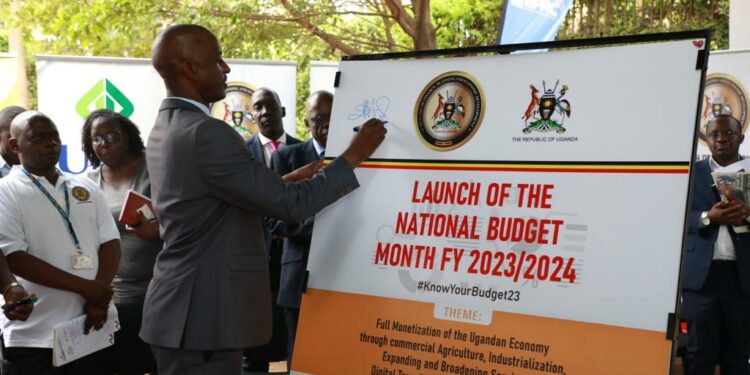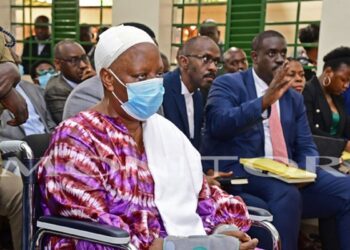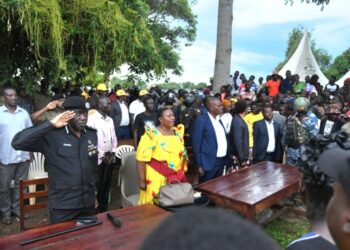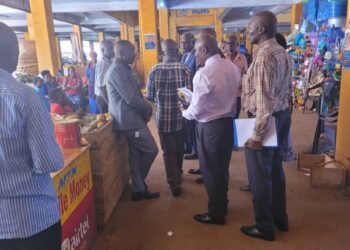The Ministry of Finance, Planning and Economic Development together with the Uganda Revenue Authority and Civil Societies have launched National Budget Month for Financial Year 2023/24 to sensitize Ugandans about the Budget and their role as citizens.
The National Budget Month launched on Tuesday at Uganda Media Center is entirely aimed at raising awareness about the budget process, soliciting feedback and input from various stakeholders and groups, and promoting a culture of civic responsibility and ownership of the budget.
Speaking during the launch, the Permanent Secretary and Secretary to the Treasury Mr Ramathan Ggoobi noted that in accordance with Sections 9 (1) and 13 (2) of the Public Financial Management Act 2015, the process of preparing the Budget Estimates for FY 2023/24 stated in September 2022 and involved wide consultations with all stakeholders including H.E the President, the Cabinet, Parliament, Ministries, Departments, Agencies and Local Governments, the Civil Society, Development Partners, the Private Sector, the academia and Community Leaders.
He added that the National Budget cannot be effective without the active involvement and engagement of a nation’s citizens because they are not only the beneficiaries of the budget but also contributors and partners in its formulation, implementation, and oversight.
“The input from the consultations informed the preparation of the Budget Strategy for FY 2023/24 under the Theme “Full Monetization of Uganda’s Economy through Commercial Agriculture, Industrialization, Expanding and Broadening Services, Digital Transformation and Market Access. The goal of the Budget for FY 2023/24 and over the medium term, is to “accelerate inclusive and green socio-economic transformation by redirecting resources towards supporting and sustaining economic recovery, jobs and wealth creation,” he said.
Mr Ggoobi also revealed that the forthcoming budget is to prioritize the effective implementation of the Parish Development Model (PDM) with the aim of lifting more Ugandans out of the subsistence economy. It has also prioritized upgrading of transport infrastructure by beginning the construction of the Standard Gauge Railway (SGR) and road maintenance. Another priority has also been given to promoting the use of small-scale solar-powered irrigation to adapt to climate change.
“Other key priority areas that the Budget will focus on are: Building infrastructure in industrial parks (connecting them to electricity, water, paved roads, ICT and other infrastructure); Investment in oil and gas to start production on schedule; Support to science-based Research and Development to kick start a knowledge-based economy; Continued support to the private sector to access affordable and patient capital through Uganda Development Bank (UDB), Uganda Development Cooperation (UDC), Agricultural Credit Facility (ACF), Small Business Recovery Fund (SBRF), Emyooga etc. Investment in tourism promotion and development to market Uganda; and enhanced domestic revenue mobilization to collect more resources to finance our development agenda and reduce borrowing,” he said.
The Commissioner General-Uganda Revenue Authority Mr John Musinguzi Rujoki welcomed the month and noted that the public must be educated, sensitized and understand their budget and their roles towards fulfilling it properly.
“The National Budget is not just a document that outlines the government’s revenues and expenditures but also reflects our national priorities, values, and aspirations. It is a vital annual tool for working towards achieving our development goals as a nation and improving the welfare of our people,” he said.
Mr Musinguzi promised that during National Budget Month, URA together with other stakeholders will raise awareness about the budget process, solicit feedback and input from various stakeholders and groups, promote a culture of civic responsibility and ownership of the budget. “URA, together with partners, will conduct Post Budget Engagements held in different locations countrywide to educate the citizens and business people about the implications of any tax policy decisions communicated in the budget.”
He added; “URA is expected to collect over 29.3 trillion in FY 2023/24, an increment of over 3.7 trillion from the current year’s target. We, therefore, call upon all Ugandans to support URA in carrying out this task for our nation’s development.”
The National Budget Month with run from11th May to 9th July 2023 and shall undertake activities to further reach the public such as Pre-Budget Media engagements on Topical Issues on the Budget/Economy, Budget Reading on Thursday, 15th June 2023, Service Excellence Awards to the best performing Central and Local Government Agencies, Post-Budget Speech Hybrid Conference, Post-Budget Speech Regional Breakfast Meeting, Post-Budget EAC Tax and Budget Dialogue, High-Level Post- Budget Speech Dialogues.
Meanwhile, the Budget Estimates for FY 2023/24, amount to Shs52.737 trillion compared to Shs 48.130 trillion this financial year. And it’s going to be financed by Domestic Resources-Shs33.341 trillion,Project Support-Shs8.256 trillion,Budget Support-Shs2.782 trillion and Domestic Re-financing (Roll-Over)-Shs8.358 trillion, totaling to Shs52.737 trillion.
Civil societies involved are; the Civil Society Budget Advocacy Group, Advocates Coalition for Development and Environment, Southern and Eastern Africa Trade Information and Negotiations Institute, Private Sector Foundation Uganda and Overseas Development Institute (ODI).
Do you have a story in your community or an opinion to share with us: Email us at editorial@watchdoguganda.com













